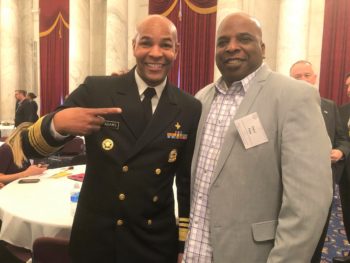
KYC’s Addiction and Recovery Programs Empower Suburban Communities to Address Substance Misuse

Surgeon General of the United States Jerome Adams poses with Daryl Pass, Comprehensive Addiction and Recovery Act Project Lead for Kenneth Young Center
According to the Center for Disease Control and Prevention, overdoses involving opioids killed more than 47,000 people in 2017, and 36% of those deaths involved prescription opioids. Initiatives like Elk Grove Village Cares, launched in 2018, address substance use disorders and addiction from a community-based approach, rather than a law enforcement problem, showing significant successes at the local level.
In response to our communities’ needs, Kenneth Young Center has expanded its clinical and nonclinical addiction and recovery services, working to build healthier, stigma-free, and safe communities for people living in and working toward recovery.
The newest of these programs is being led by Daryl Pass, KYC’s Comprehensive Addiction and Recovery Act (CARA) Project Lead. Daryl joined KYC in October and quickly coordinated with local mayors and village managers to discuss strategies and goals to build training resources addressing addiction and recovery. His work will focus on coordinating a suburban network to train police officers, first responders, social service agencies, and community members on carrying naloxone, a medication used to counter the effect of opioid overdose with little potential for abuse. In addition, Daryl will lead SMART Recovery Groups for individuals struggling with substance misuse and addiction, as well as those in recovery. SMART Recovery focuses on four key points to provide participants the tools they need to live healthier and positive lifestyles:
- Build and maintain motivation
- Cope with urges
- Manage thoughts, feelings, and behaviors
- Live a balanced life
Unlike many recovery programs like Alcoholics Anonymous or Narcotics Anonymous, SMART Recovery is not religiously affiliated, making it more easily inclusive to people of varying backgrounds and cultures, and aims to hold each participant responsible for their recovery journey. Groups specifically catering to youth, adults, and the LGBTQ+ community have been established to create safe spaces for participants to connect, discuss, and learn from one another.
“The only thing that’s universal is that you seek a solution” shared Daryl, whose passion and enthusiasm light up the room. Daryl has been sober since 2012 and has since built his life around supporting others through to recovery. With a warm smile, he continues that participants are encouraged to change their individual mindsets from substance misuse to transformational thinking. They must remove negative and judgmental labels, and instead focus on your personal experience. “Educate yourself on the disease, respect it, and learn to build your recovery.”
As part of the Northwest Suburban Cook CARA project, KYC’s work will focus specifically on our surrounding communities: Elk Grove Village, Arlington Heights, Schaumburg, Rolling Meadows, Des Plaines, Palatine, Prospect Heights, Mount Prospect, and Hoffman Estates. However, communities and clients will be accepted and supported outside this key area.
“We’re thrilled to have Daryl on our team” said KYC’s CEO, Grace Hong Duffin. “Within moments of meeting Daryl, his sincerity and compassion drive open and honest conversation. Whether educating the community or directly supporting people working toward recovery, I know Daryl will transform how people understand addiction.”
To join a SMART Recovery Group or to learn more, contact smartrecovery@kennethyoung.org.


Previous Article Next Article

